Galley electrical wire fire
test
Greenwood Mississippi May 01-12,
2000
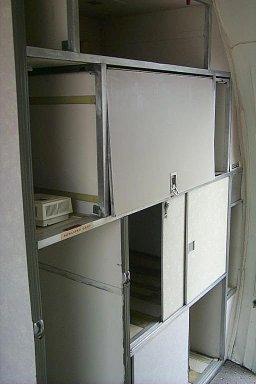 |
This G-4 aft galley was chosen by the Pyrogen test team to simulate
a high BTU electrical cabin fire. Galleys are a major contributor to smoke
and electrical fires in commercial aircraft. An identical galley was removed
form another aircraft for this series.
The galley was then modified with
a viewing window and the inner dividers removed. 128 Wires were placed
in the lower section over a 400 mm fuel cup. Located away from the Pyrogen
discharge path, the wire was pre burned for 1 minute and the aerosol used
to extinguish the fire. Several additional smaller (25 mm) fuel cups were
placed at different levels inside the galley. After the pre burn the doors
were closed and the agent dispensed into the enclosure.
Fuel cup and wire bundle temperatures were monitored and recorded
with type K thermal couples Electrical wire temperature exceeded 200 deg
C prior to discharge, with no reignition of the fuel cups was observed. |
|
|
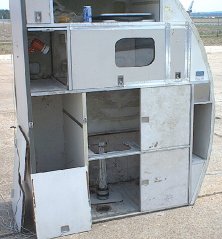
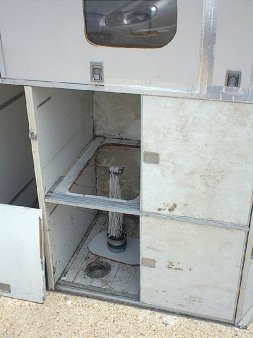
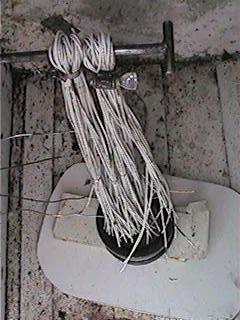
This series shows the test setup. Five galley fires were performed
to verify the repeatability of the experiment. Additional electrical
wiring arcs and fires
in the in the electronics bay were also performed Again the
superior extinguishment capabilities of Pyrogen are proven in real world
test situations.
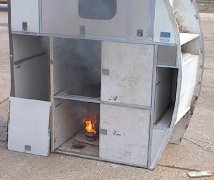
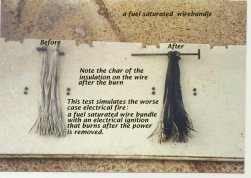
This test group is made up of an International Team brought in to
Greenwood from
Australia, Malaysia and across U.S. Supported by the NAVAL AIR SYSTEMS
COMMAND
this proved to be one of the most cost effective test to date.
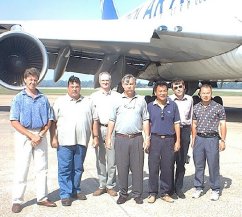
Learn more by industry at the links below





Home
fire protection systems , Halon
replacement , fire Suppression , fire suppression systems , fire
extinguishers , fire science, flame management, US EPA, SNAP, ISO, ICAO,
FAA US DOT, NFPA, SAE, FM, NIST, ATA, UL, SSL, AS/NZS, ODP , GWP , Pyrogen
, PYROGEN , Airline Cargo conversions , Class A fire , Class B fire , Class
C fire , EMAA, Encapsulated Micron Aerosol Agent, FAR 25. Aircraft Cargo
Fires, Telecommunications fires , Transportation fires , Petrol chemical
fires , Fire detection, Automobile Fire , Truck fires , Train fires , Building
fires , Structural fires , petroleum fires , engine fires , marine fires
, cargo fires , wood fires , Halon flooding , UL 1058, aircraft fire protection
, aircraft crash , airline cargo fire , airline fire protection , FAA Technical
center , Oil rig fires , gas rig fires , vehicle fires , electrical fire
suppression , computer room fires , ship fires , machinery fires , merchant
vessel fires , train fires , generator fires , battery fires , Wheel fires
, brake fires , tire fires , car fires , home fires , Loss productivity
, boeing fire test , 737 fire test , NRL , Naval Research Laboratory
, Naval air systems command , NASC , NAVAIR , AS/NZS 4487:1997 ,
Joint strike fighter , JSF, HARC , NTSB , Transport canada , NIST , FAA
Technical Center , Thermal Acoustic Insulation Blankets , IMO , International
Maritime commission , USCG , United states coast guard , MCA , Pyrogen
Ltd. Pyrogen Corp. Sdn. Bhd. , IAFC , IFPA ,






